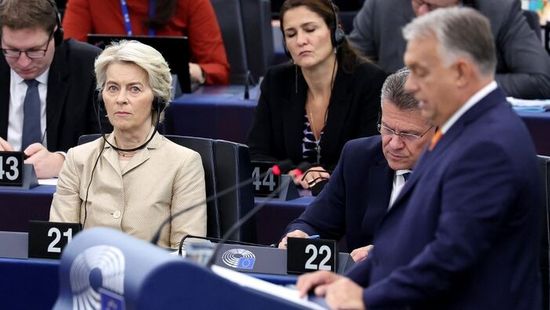Dokumentumok bizonyítják: Brüsszelben arra készülnek, hogy a Fidesz nyeri meg a választást

Az elemző szerint ráadásul az is egyértelmű, miért nem lenne rájuk szükség, ha Magyar Péteréket tartanák esélyesnek.

The United States Congress will hold a hearing on Wednesday, February 27, entitled, “Anti-Semitism: A Growing Threat to All Faiths.” It caught our eye because, apparently, while examining the issue of Anti-Semitism in Europe it will single out a few countries, including – you guessed it – Hungary and will feature testimony from Dr. Tamás Fellegi, the former minister.
The news was reported by the Hungarian news agency, MTI, who spoke with Fellegi in a piece published on Monday. The former minister says he’ll be focused on providing “a straightforward, honest testimony based on facts” and that one of his main messages will be “that all democratic Hungarian forces are unified in their opposition to Anti-Semitism.” Fellegi, who left government early last year and heads up a private sector consulting firm, EuroAtlantic Solutions, says he will emphasize that “it is our duty to stand up against growing Anti-Semitism around the world by the strongest means possible.”
That gives us some hope that we’ll hear some balanced discussion, which would be a refreshing departure from much of what we’ve seen in the international realm on Hungary. Still, why is the US Congress holding a hearing about this and why is Hungary on the agenda?

The Committee on Foreign Affairs of the US Congress lists the hearing on their website under the Subcommittee on Africa, Global Health, Global Human Rights, and International Organizations. The subcommittee, we learned, is the only regional subcommittee that also has “functional jurisdiction,” including “oversight pertaining to implementation of the Universal Declaration of Human Rights, and other matters relating to internationally-recognized human rights.”
According to the announcement, the hearing will consist of two panels. The first will include organizations in the US, including the U.S. Commission on International Religious Freedom, represented by Katrina Lantos Swett, the daughter of the late human rights advocate and Hungarian Holocaust survivor, Congressman Tom Lantos. The second panel lists as witnesses Rabbi Andrew Baker, Personal Representative on Combating Anti-Semitism from the Organization for Security and Co-operation in Europe, Rabbi David Mayer, professor from the Italian Pontifical Gregorian University, Willy Silberstein, chairman of the Swedish Committee Against Anti-Semitism and Dr. Tamás Fellegi.
It’s difficult not to notice that these latter witnesses – all of whom must be invited by the subcommittee and cannot be nominated by governments – are leaders of organizations devoted to the topic of Anti-Semitism or rabbis, except in the case of the Hungarian representative, Fellegi.
We hope this is further reason to hope that Hungary will get a fair shake. We also hope that the hearing will look at the broader European context. Hungary is certainly no stranger to the issue of Anti-Semitism and the extremist politics that often accompany it, but it is not alone. Extremist political movements have grown in popularity in several European countries over the last several years of economic crisis.
On those questions, we’ll find out soon. The hearing will begin on Wednesday, February 27, at 3:00 p.m. Budapest time.
Hungarian Globe bloggers and friends will be live tweeting the event, assuming webcast will be available. Follow @HungaryLive and the hashtag #USConghearing